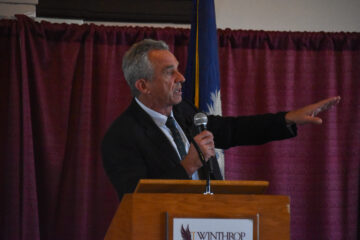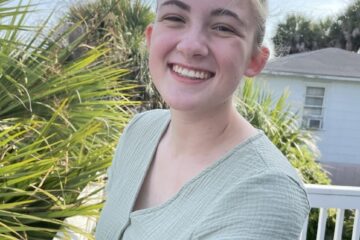“Have you experienced doubts about your sexuality?”
“Have you been raped or experienced sexual violence?”
“Have you or a family member contemplated suicide?”
“Do you consider yourself Atheistic or Agnostic?”
Imagine being asked these questions by a complete stranger, in front of 30 or more of your peers, on one of the first days of a new semester at university. This is not an imaginary situation.
On Aug. 15, 2019, I attended a staff writers’ workshop for Winthrop’s student publications with the other editors and writers from Winthrop’s two newspapers and art’s magazine. During the day, we took a diversity training workshop. While optional for staff writers, it was mandatory training for editors. After entering and filling out a pre-workshop survey, the Diversity Peer Educators from Winthrop University’s Office of Diversity & Student Engagement began the training exercise. They rightly explained that understanding and promoting diversity is important because we are a diverse group at Winthrop and we should learn to coexist with one another.
One of the first questions was funny and simple, “Who believes pineapple belongs on pizza?” You could either stand in affirmation, or sit in disagreement. Those were the only options. In addition to the questions above, more personal questions were asked. Political questions were asked, such as “do you believe everyone should have healthcare?” and “do you believe everyone has the right to own a firearm?” Dirty looks were exchanged across the room when people stood or sat. These questions manipulated us between between a rock and a hard place. We could only answer in the affirmative or the negative– privacy was disregarded.
The problem with this kind of exercise is that is draws lines between people and their ideologies, we were actually being divided, not united. These questions did not relate to increasing tolerance and open-mindedness through journalistic work. It was a public interrogation demanding highly personal information. Many of these questions shouldn’t have been asked. This is not information you would normally share with people you had just met. Looking around, you could see who had experienced trauma in their lives or disagreed with you on politics, it felt inquisatory.
In no other setting, other than with a licensed therapist, would anyone dare to ask about such traumatic experiences as rape and suicide. Following the exercise, Several people left the room in an emotional state.
At the end of the training, it was obvious to me that something was wrong, but I couldn’t put my finger on it at the time. You could feel the tension and shame in the air. A classroom of Winthrop students had just been bullied into disclosing traumatic details to people they didn’t even know.
To be clear, the Educators told us the classroom was a safe space and what was said there was not to leave the room. But it did. Our private information left in the minds of each student who walked out that door. How can I not remember this information every time I encounter one of my colleagues? Will they judge me for what they know about my political or religious views or my sexual orientation before even knowing me?
What was the point of this survey? The Educators did not tell us why knowing this information about each other was unifying, all they could say was that diversity was important. When I talked to Kinyata Brown, assistant dean for diversity, engagement, and inclusive excellence, she said that although she couldn’t speak exactly for that event (as she was not present), the point of that specific training, is “really, for you to think about your personal values and your own experiences… It was definitely a values-based activity”.
Sharing personal values and experiences are, of course, good for enlightening conversation on the Winthrop campus. I have seen an exercise along these lines conducted on campus with less intrusive questions, and it did seem useful. In this case, however, these questions were a violation of privacy and I continue to wonder how they promoted the overall goal of encouraging inclusion, acceptance or unity.
“this type of peer education group, is present at other campuses too,” Brown said. She further noted that there is a wide selection of trainings, conferences, and literature backing up the decisions made by the Diversity Peer Educators. Diversity is a value worth pursuing and I believe groups like DPE can be beneficial for the student body. According to Brown, the feedback to DPE training, in general, has been overwhelmingly positive. However, this particular exercise did not seem to fit in with that overall goal.
That day, the Educators ended their talk saying that we should not judge each other for these characteristics. Everyone judges, this is not something we can easily control, or should for that matter. The key is not to abstain from judging, but to judge correctly. To properly use our own mental capacity to value people and actions. Unfortunately, we now possess private information about our classmates without a relationship or context. Looking back, I wish I had stood and publically objected to this invasion of privacy; especially for the benefit of those who have experienced trauma and whose privacy was invaded.




